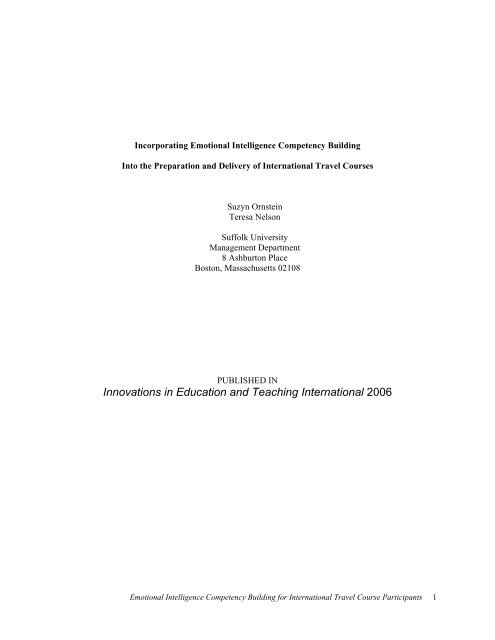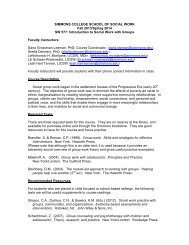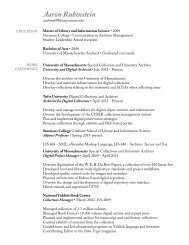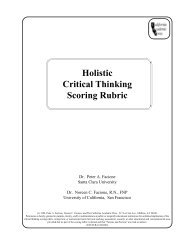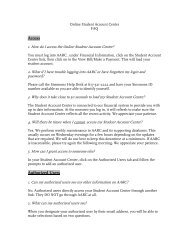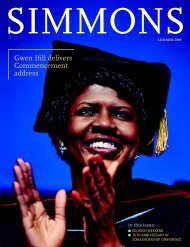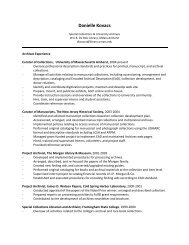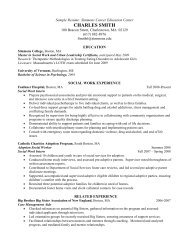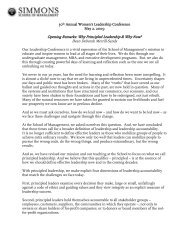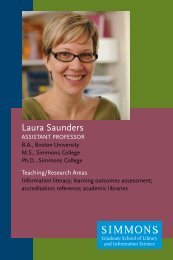Incorporating Emotional Intelligence into the Preparation and ...
Incorporating Emotional Intelligence into the Preparation and ...
Incorporating Emotional Intelligence into the Preparation and ...
Create successful ePaper yourself
Turn your PDF publications into a flip-book with our unique Google optimized e-Paper software.
<strong>Incorporating</strong> <strong>Emotional</strong> <strong>Intelligence</strong> Competency BuildingInto <strong>the</strong> <strong>Preparation</strong> <strong>and</strong> Delivery of International Travel CoursesSuzyn OrnsteinTeresa NelsonSuffolk UniversityManagement Department8 Ashburton PlaceBoston, Massachusetts 02108PUBLISHED INInnovations in Education <strong>and</strong> Teaching International 2006<strong>Emotional</strong> <strong>Intelligence</strong> Competency Building for International Travel Course Participants 1
course well, <strong>and</strong> up-front, we believe that conflict, fear, <strong>and</strong> stress can be reduced while educational valueis enhanced. In this paper we begin by outlining <strong>the</strong> basics of <strong>the</strong> emotional intelligence construct, <strong>and</strong><strong>the</strong>n proceed to discuss who benefits from EI competency building <strong>and</strong> how EI competencies can bedeveloped in <strong>the</strong> travel course process. Additionally, in <strong>the</strong> Appendix, we present specific classroomtraining notes for trip leaders, often professors <strong>and</strong> administrators without formal knowledge ofinterpersonal skills training. We also direct <strong>the</strong>se ideas to travel course students to provide an overview ofbasic concepts <strong>and</strong> to serve as an in-class discussion catalyst. Finally, program administrators may find<strong>the</strong> material valuable as <strong>the</strong>y designate trip leaders, <strong>and</strong> as <strong>the</strong>y build <strong>and</strong> update international programofferings.<strong>Emotional</strong> <strong>Intelligence</strong>: A Brief ReviewSimply stated, emotional intelligence is <strong>the</strong> ability to recognize, regulate, <strong>and</strong> control one’s emotions tomost effectively interact with o<strong>the</strong>rs (Goleman, 1995, 1998). This concept is predicated on <strong>the</strong>underst<strong>and</strong>ing that emotions (i.e., feelings) are <strong>the</strong> driving force of motivation. A poor underst<strong>and</strong>ing<strong>and</strong>/or control of one’s feelings may result in undesirable interactions with o<strong>the</strong>rs <strong>and</strong> <strong>the</strong> blocking ofvaluable inputs that cannot be fully attended to when emotions are heightened (for an extensive review of<strong>the</strong> literature on this subject please see Bar-On & Parker, 2000; Cherniss & Goleman, 2001a).The phrase "emotional intelligence" was first introduced by Salovey <strong>and</strong> Mayer (1990) to identify aconstellation of intra- <strong>and</strong> interpersonal competencies. The EI construct was popularized by DanielGoleman’s best-selling book of <strong>the</strong> same name (Goleman, 1995). Subsequent research has demonstratedboth <strong>the</strong> reliability <strong>and</strong> validity of <strong>the</strong> EI construct (e.g., Caruso, Mayer, & Salovey, 2002; Saklofske,Austin, & Minski, 2003). Studies have found support for <strong>the</strong> incremental value of EI over traditionalpersonality <strong>and</strong> skills based assessments in <strong>the</strong> ability to predict increased effectiveness in <strong>the</strong> workplace(Jacobs, 2001, McClell<strong>and</strong>, 1998). Lam <strong>and</strong> Kirby (2003) found evidence to suggest EI “uniquelyexplained individual cognitive-based performance over <strong>and</strong> beyond <strong>the</strong> level attributable to generalintelligence” (p. 133). Shutte et al. (2001, 2002) have carefully demonstrated that higher emotionalintelligence is related to higher self-esteem, empathy, self-motivation, <strong>and</strong> cooperativeness. Numerouso<strong>the</strong>r studies have explored one facet or ano<strong>the</strong>r of <strong>the</strong> EI construct in <strong>the</strong> past five years (see e.g.,Cherniss & Goleman, 2001a).While <strong>the</strong> specific numbers <strong>and</strong> definitions of <strong>the</strong> EI competencies <strong>the</strong>mselves has been muchdiscussed (Boyatzis, Goleman & Rhee, 2000; Bar-On, 2001; Stein & Book, 2000), all fundamentallyagree that <strong>the</strong> EI construct can be broken <strong>into</strong> a number of competencies that share a related set of skills(Gowing, 2001). Based on <strong>the</strong> suggestions of many scholars that each EI competency is demonstrated by<strong>the</strong> effective use of specific skills (Goleman, 1998, 2001; Goleman, Boyatzis & McKee 2002) we haveselected <strong>and</strong> defined <strong>the</strong> competencies <strong>and</strong> associated specific skills we believe to be relevant to <strong>the</strong>international travel course experience. We choose <strong>the</strong>se based on Goleman’s work (1998) which wefound to be <strong>the</strong> simplest scheme for organizing our material. The competencies <strong>and</strong> <strong>the</strong>ir associated skillsare presented in Table 1. In <strong>the</strong> discussion that follows we use examples from international travel courseexperience to illustrate each competence.<strong>Emotional</strong> <strong>Intelligence</strong> Competency Building for International Travel Course Participants 3
Table 1: The Five Competencies of <strong>Emotional</strong> <strong>Intelligence</strong> <strong>and</strong> <strong>the</strong>ir Behavioral Description Skillsper Goleman (1995, 1998)Self Awareness• <strong>Emotional</strong> Awareness: Ability to accurately recognize one’s emotions <strong>and</strong> <strong>the</strong>ir causes.• Accurate Self-Assessment: Realistic <strong>and</strong> appropriate identification of one’s strengths <strong>and</strong>weaknesses.• Self-Confidence: Belief that one is capable (mentally <strong>and</strong> physically) of accomplishing one’sgoals.Motivation• Achievement Drive: The inspiration to achieve high accomplishment.• Commitment: Persistence in <strong>the</strong> face of obstacles/difficulties/failures.• Initiative: Taking control of a situation because you choose to.• Optimism: Ability to think positively about <strong>the</strong> future.Self Regulation•Self-Control: Ability to keep emotions <strong>and</strong> behaviors in check.•Trustworthiness: Ability to “say what you mean <strong>and</strong> mean what you say.”•Conscientiousness: Concern for, <strong>and</strong> actions directed, at follow-through.•Adaptability/Innovation: Ability to shift behavior <strong>and</strong> thought from preferred to o<strong>the</strong>r mode.Social Skills•Influence: Ability to communicate a message so that people will change <strong>the</strong>ir behaviors <strong>and</strong>thoughts.•Collaboration: Ability to coordinate with <strong>and</strong> respond to o<strong>the</strong>rs.•Teamwork: Ability to form effective working relationships with o<strong>the</strong>rs.•Conflict Management: Ability to face conflict <strong>and</strong> find a solution that brings opposing partiespositive outcomes.Empathy•Underst<strong>and</strong>ing O<strong>the</strong>rs: Recognizing o<strong>the</strong>r’s emotions through non-verbal <strong>and</strong> verbal cues.•Developing O<strong>the</strong>rs: Helping o<strong>the</strong>rs to grow <strong>and</strong> accomplish <strong>the</strong>ir goals.•Service Orientation: Desire to help o<strong>the</strong>rs.•Political Awareness: Recognizing <strong>the</strong> realities of power <strong>and</strong> politics.Scholars of EI agree that <strong>the</strong> bedrock competency is self-awareness (Cherniss & Adler, 2000; Cooper &Sawaf, 1996; Goleman, 1995, 1998, 2001; Goleman, Boyatzis & McKee, 2002; Salovey & Mayer, 1990;Sosik & Megerian, 1999, Stein & Beck, 2000). People adept at self-awareness recognize <strong>the</strong>ir emotions,<strong>the</strong>ir genesis, <strong>and</strong> <strong>the</strong> potential outcome of <strong>the</strong>ir state of feeling. In <strong>the</strong> context of an international travelcourse, <strong>the</strong> student with a high degree of self-awareness might recognize her anxious feelings aboutleaving her family for a 2-week travel course to ano<strong>the</strong>r continent. She recognizes that her anxiety maylead her to “snap” at her classmates. Preventing that behavior, or apologizing for it when it occurs, willdecrease <strong>the</strong> likelihood that her colleagues will ostracize her. Conversely, <strong>the</strong> self-unaware might not<strong>Emotional</strong> <strong>Intelligence</strong> Competency Building for International Travel Course Participants 4
constituencies: <strong>the</strong> individual travelers (i.e., students <strong>and</strong> professor), <strong>the</strong> international travel course, <strong>the</strong>group of travelers, <strong>and</strong> <strong>the</strong> sponsoring institution.The Individual TravelerFor individual students, <strong>the</strong> international travel course is a multi-faceted activity with <strong>the</strong> followingcommon, inter-related challenges: international travel, travel in a group, travel with fellow students whoare unlikely to be well known to you, travel with a supervising professor/administrator, <strong>and</strong> travelparticipation to be graded for course credit. These components, separately <strong>and</strong> toge<strong>the</strong>r, delivercomplexity <strong>and</strong> likely strong emotions including uncertainty, stress, <strong>and</strong> fear. Travel participants whobecome aware of <strong>and</strong> perhaps even increase <strong>the</strong>ir EI, will better manage <strong>the</strong>ir own emotional reactions(Mat<strong>the</strong>ws & Zeidner, 2000) <strong>and</strong> as a result <strong>the</strong> group of travelers will experience an increased grouplevel of EI <strong>and</strong> effectiveness (Druskat & Wolff, 2001).Students who can learn to recognize <strong>the</strong>ir emotions will better underst<strong>and</strong> <strong>the</strong>ir energy ebbs <strong>and</strong>flows throughout <strong>the</strong>ir travels. As a result, <strong>the</strong>y may ask for help from <strong>the</strong>ir colleagues when faced with aproblem or seek quiet time when <strong>the</strong>y are exhausted. Similarly, students who can control <strong>the</strong>ir reactions(e.g., making distasteful facial gestures, in view of <strong>the</strong>ir hosts, when provided an unfamiliar form of food)are less likely to embarrass <strong>the</strong>mselves, <strong>and</strong> are more likely to be able to accept feedback when <strong>the</strong>y aretold of a mistake. Obviously, students who can be persistent in <strong>the</strong> face of setbacks will h<strong>and</strong>le problemswith greater equanimity. As a result, people who are most in touch with, <strong>and</strong> in control of <strong>the</strong>ir emotionswill be available to gain <strong>the</strong> greatest learning from <strong>the</strong>ir international travel experience. This will happenbecause those who are intra-personally adept will use nei<strong>the</strong>r time nor energy in ways that undermine<strong>the</strong>ir learning opportunities.While our focus in this article is predominantly on <strong>the</strong> travel experience itself, we want toacknowledge that people with more, ra<strong>the</strong>r than less EI have been found to generally experience greatersuccess in <strong>the</strong>ir accomplishments <strong>and</strong> relationships (e.g., Goleman, 1998, Sosik & Megerian, 1999; Staw& Barsade. 1993). Bush <strong>and</strong> Bush (1998) report that practicing marketers rank <strong>the</strong> following EI skillsamong <strong>the</strong> top ten predictors of career success for international marketing students: having patience (i.e.,self control), demonstrating perseverance (i.e., motivation), communicating misunderst<strong>and</strong>ings (i.e. socialskill), <strong>and</strong> dealing with different communication styles (i.e., empathy). While this research was not anexplicit test of EI concepts, <strong>the</strong> competencies are <strong>the</strong> same. Such studies highlight an added benefit of EItraining for students during international travel courses – <strong>the</strong> EI knowledge <strong>and</strong> training may serve notonly <strong>the</strong> travel experience, but personal <strong>and</strong> career objectives as well. Taking this wider view, <strong>the</strong>international travel course can be viewed as a sort of boot camp for EI training. With a facilitator onboard, multiple intense days of opportunity for practice, <strong>and</strong> a continual stream of challenging events,students on a multi-week journey can practice <strong>and</strong> develop <strong>the</strong>ir skills at EI while engaged in real-time,meaningful situations (Cherniss & Goleman, 2001b).EI training can also benefit <strong>the</strong> international course trip leader. Like <strong>the</strong>ir students, trip leaders face<strong>the</strong> challenges <strong>and</strong> trials of international travel but <strong>the</strong>y carry an additional burden as <strong>the</strong>ir role sets <strong>the</strong>mapart. Students are not peers <strong>and</strong> leaders lose some easy camaraderie as a result of <strong>the</strong>ir role. Managing<strong>the</strong> social “off” hours is a particular challenge for group travel leaders – do <strong>the</strong>y party <strong>and</strong> sightsee with<strong>the</strong> students, <strong>and</strong> if so, to what degree, or do <strong>the</strong>y maintain a professional distance? In addition, <strong>the</strong> leadershoulders <strong>the</strong> ongoing responsibility of keeping <strong>the</strong> group safe, engaged, <strong>and</strong> satisfied. This requires that<strong>the</strong>y be constantly on call <strong>and</strong> ready to h<strong>and</strong>le crises. As a result, being a trip leader can be lonely:support networks of peers may not be easily accessed <strong>and</strong> <strong>the</strong> dem<strong>and</strong>s of <strong>the</strong> job may require that toughdecisions be made <strong>and</strong> enforced. An increased proficiency at employing EI skills can give trip leadersbetter coping skills, higher energy, enhanced creativity, <strong>and</strong> improved decision making (Cooper & Sawaf,1996; Goleman, Boyatzis & McKee, 2002). This could benefit <strong>the</strong>ir personal travel experience as well as<strong>the</strong>ir professional competence (Schettler, 2002).<strong>Emotional</strong> <strong>Intelligence</strong> Competency Building for International Travel Course Participants 6
The CourseWe believe that <strong>the</strong> travel course overall benefits from <strong>the</strong> inclusion of EI. This happens in a numberof ways. First, study <strong>and</strong> discussion of EI legitimizes real concerns that students have about <strong>the</strong> travelcourse process. By allowing for open <strong>and</strong> honest discussion of concerns, <strong>the</strong> underlying fears can bemanaged ra<strong>the</strong>r than staying hidden to crop up later, perhaps with unfortunate consequences. Second, <strong>the</strong>travel course that takes account of process issues is likely to run more smoothly than <strong>the</strong> one that doesn’t.Third, <strong>the</strong> inclusions of EI serves as a model of advanced planning that all students interested incompetent business management derive benefit in observing (for more on <strong>the</strong> addition of EI training to<strong>the</strong> classroom, see Tucker <strong>and</strong> Sojke, 2000). Fourth, by adding process issues to a course where <strong>the</strong>y arenot expected, student value is delivered above <strong>and</strong> beyond what had been anticipated. Finally, a wellmanagedcourse is more likely to attract student attention <strong>and</strong> dem<strong>and</strong>. This builds course enrollment <strong>and</strong>encourages <strong>the</strong> development of additional travel courses by <strong>the</strong> institution.The Group of TravelersAs <strong>the</strong> long history of research <strong>into</strong> teams <strong>and</strong> groups has demonstrated, groups of people willbehave in ways that individuals will not. Additionally, it is recognized that groups (in this case <strong>the</strong> studenttravelers) develop in predictable stages. Introducing <strong>the</strong> ideas of EI up front during <strong>the</strong> forming <strong>and</strong>norming stages allows <strong>the</strong> topics of emotions, stress, coping, <strong>and</strong> relationships to be legitimized as anappropriate element of <strong>the</strong> course of study <strong>and</strong> of <strong>the</strong> group’s experiences. This will <strong>the</strong>n hopefully provevaluable in <strong>the</strong> inevitable storming stage (Tuckman & Jensen, 1977). Moreover, when a group of relativestrangers travels toge<strong>the</strong>r over many days <strong>and</strong> long distances, it is certain that stresses, incompatibilitiesof personalities, honest disagreements, <strong>and</strong> ineffective communication will lead <strong>the</strong> group to be less thanoptimally successful. As a result, it is imperative that <strong>the</strong> EI competencies of collaboration, cooperation,<strong>and</strong> communication be dealt with directly <strong>and</strong> carefully. The benefits to this proactive approach will likelyinclude increased listening, growth from conflict <strong>and</strong> adversity, <strong>the</strong> facilitation of effectivecommunication, <strong>and</strong> <strong>the</strong> development of a more closely-knit community (Druskat & Wolff, 2001).The Sponsoring InstitutionWhen students travel internationally <strong>the</strong>y become de-facto ambassadors not only of <strong>the</strong>ir homecountries but also of <strong>the</strong>ir sponsoring institutions. Hosts <strong>and</strong> o<strong>the</strong>rs in <strong>the</strong> visited country will formimpressions of <strong>the</strong> institution based on <strong>the</strong> behavior of <strong>the</strong> students. It is for this reason that <strong>the</strong> institutionhas a great deal to gain/lose by <strong>the</strong> laudable/deplorable behavior on <strong>the</strong> part of its students. For example,some years ago one of our students traveled to Asia where <strong>the</strong> st<strong>and</strong>ards of food preparation wereconsiderably different from those in <strong>the</strong> States. This student, who had previously been a nurse (<strong>and</strong> was<strong>the</strong>refore especially knowledgeable about sanitation), became greatly concerned about her health <strong>and</strong>safety. Unfortunately, her concern was so extreme (<strong>and</strong> in reality based on limited evidence) that it notonly interfered with her ability to participate in meals with her colleagues, but also led her to makefrequent, vocal complaints that her colleagues found disruptive. Moreover, <strong>the</strong> hosts were greatly insulted<strong>and</strong> expressed some concern about inviting our students back in <strong>the</strong> future! Clearly, this individual’s poormanagement of her reactions had immediate negative repercussions. Her responses also had <strong>the</strong> potentialto damage <strong>the</strong> reputation of our institution <strong>and</strong> our ongoing relationship with our hosts.Suggestions for <strong>Incorporating</strong> EI Competency Building <strong>into</strong> <strong>the</strong> Planning <strong>and</strong> Delivery ofInternational Travel CoursesOur suggestions for incorporating EI competency building <strong>into</strong> <strong>the</strong> planning <strong>and</strong> delivery ofinternational travel courses are based on our own experience in integrating this practice <strong>into</strong> an MBAtravel course curriculum <strong>and</strong> on <strong>the</strong> literature that has developed around training for increased emotionalintelligence (Cherniss & Adler, 2000; Cherniss & Goleman, 2001b). We take <strong>into</strong> consideration <strong>the</strong> fact<strong>Emotional</strong> <strong>Intelligence</strong> Competency Building for International Travel Course Participants 7
eview tumultuous events. The group will hopefully be able to resolve any differences <strong>and</strong> leave <strong>the</strong>group experience with fond memories <strong>and</strong> gratitude to <strong>the</strong> institution for <strong>the</strong> experiences gained.The Course Travel PeriodThe travel period is <strong>the</strong> prime time to put EI skills <strong>into</strong> practice. Trip leaders play an important rolein creating <strong>the</strong> proper climate for EI to be discussed <strong>and</strong> implemented. From a pedagogical perspective<strong>the</strong> manner in which <strong>the</strong> leaders h<strong>and</strong>le decision-making, communication, <strong>and</strong> <strong>the</strong>ir personal emotionalresponses serves as a powerful model for <strong>the</strong>ir students’ learning (Kouzes & Posner, 1993). Trip leadersshould expect that students will look to <strong>the</strong>m for emotional as well as practical guidance when <strong>the</strong> goinggets tough. It is also <strong>the</strong> case that <strong>the</strong> leaders emotional mood will be transmitted to <strong>and</strong> mirrored by <strong>the</strong>student travelers (Drusak & Wolff, 2001).We recommend that leaders schedule routine discussion times for EI issues. Pick a time when <strong>the</strong>group is relatively fresh, toge<strong>the</strong>r, <strong>and</strong> relaxed -- perhaps during breakfast before <strong>the</strong> pressures of <strong>the</strong> dayhave begun. Establish what discussion topics/issues are “fair game” <strong>and</strong> which are “off base”. Try to keeppersonal feedback ligh<strong>the</strong>arted. Make sure to practice EI at crisis moments. When <strong>the</strong> bus breaks down,tempers flare, <strong>the</strong> unexpected <strong>and</strong> unpleasant happens, remind participants that <strong>the</strong> EI tools are availableto be exercised.One exercise that we have personally found to be very valuable during travel is <strong>the</strong>Energy/Openness/Focus Activity of Cooper & Sawaf (1996). This exercise recommends that teammeetings begin by asking each person to identify his/her level of energy, openness, <strong>and</strong> focus on a scaleof 1 to 10. One would mean you have no energy, openness, or focus <strong>and</strong> 10 would mean you are burstingwith empathy, openness, <strong>and</strong> focus. This exercise raises <strong>the</strong> awareness <strong>and</strong> empathy of team participantsfor <strong>the</strong>ir fellows. It also builds self-awareness of a group member’s own emotional state. Additionalspecific suggestions that we provide to students on laminated cards to carry during travel are identified<strong>and</strong> discussed in Table 2.Table 2:Ten Suggestions for Increasing <strong>and</strong> Practicing <strong>Emotional</strong> <strong>Intelligence</strong> during International Travel1. Conduct energy, openness, <strong>and</strong> enthusiasm assessments. Ask yourself <strong>and</strong> o<strong>the</strong>rs at regular<strong>and</strong> crucial times to assess <strong>and</strong> share levels of <strong>the</strong>se qualities (from Cooper & Sawaf, 1996).2. Hold angry reactions until tomorrow. Sometimes it’s best to keep feelings to ourselves – atleast in <strong>the</strong> short term. Underst<strong>and</strong> how <strong>the</strong> pressures of travel can heighten emotions; rememberthat <strong>the</strong>se are most likely time limited relationships. Think through how reactions to anger shouldbe expressed – or not expressed – for yourself <strong>and</strong> o<strong>the</strong>rs.3. Dedicate specified times in <strong>the</strong> itinerary for group discussion on process. There is somuch to do. Build in specific times when <strong>the</strong> group will assess how things are going <strong>and</strong> stick toit. Give group members <strong>the</strong> opportunity to make suggestions, air concerns. Improvements – initinerary <strong>and</strong> mood – may follow.4. Specify personal goals for <strong>the</strong> course before traveling. Part of <strong>the</strong> pre-trip EI preparationshould be for each traveler to specify <strong>the</strong>ir personal goals for <strong>the</strong> trip – to <strong>the</strong>mselves <strong>and</strong> too<strong>the</strong>rs. This gives everyone good information about fellow travelers <strong>and</strong> a more accurate base onwhich to assess people’s choices <strong>and</strong> attitudes during <strong>the</strong> trip.5. Consider <strong>the</strong> trip's pacing. There’s so much to do <strong>and</strong> so little time! But remember to rest<strong>and</strong> build in some ‘alone time’ on a regular basis to allow self-awareness to surface.<strong>Emotional</strong> <strong>Intelligence</strong> Competency Building for International Travel Course Participants 9
Continued/Table 2: Ten Suggestions for Increasing <strong>and</strong> Practicing <strong>Emotional</strong> <strong>Intelligence</strong> duringInternational Travel6. Work to connect with each fellow traveler. Avoid splitting yourself off from <strong>the</strong> group withone or two special friends. This reduces your resources <strong>and</strong> limits your future options while itundermines group process.7. Write a journal. Writing is a tool that can help surface feelings <strong>and</strong> ideas about how tomanage <strong>the</strong>m. Keeping a journal can serve as a practice <strong>and</strong> reminder of <strong>the</strong> physical <strong>and</strong>emotional journey you are taking8. Be wary of <strong>the</strong> results of alcohol consumption. Often traveling adults who don’t know eacho<strong>the</strong>r well socialize with alcohol. When tired, stressed, <strong>and</strong> in unfamiliar surroundings, drinkingmay depress your ability to exercise EI competencies.9. Adopt a Live <strong>and</strong> Let Live philosophy. Your engagement with your fellow travelers, whileintense, is time limited. Try to shrug off o<strong>the</strong>rs’ idiosyncrasies if <strong>the</strong>y don’t overtly intrude onyour experience.10. Schedule a trip de-briefing session before traveling. Everyone should know that <strong>the</strong> groupwill ga<strong>the</strong>r on return to review <strong>the</strong> trip, settle outst<strong>and</strong>ing issues, <strong>and</strong> share improvement ideas for<strong>the</strong> next course. This also gives participants <strong>the</strong> opportunity to self-regulate <strong>and</strong> delay workingout some problems until return. Also assess <strong>the</strong> EI process. How can skills learned by applied indaily life?The Post Travel PeriodIn terms of group development, now is <strong>the</strong> time for adjourning <strong>and</strong> parting. Inasmuch as <strong>the</strong> group hasworked closely toge<strong>the</strong>r under intense conditions, <strong>the</strong>re may be unfinished business in terms ofunresolved conflict. Additionally, <strong>the</strong>re is likely to be some letdown <strong>and</strong> sadness because a remarkableexperience has come to an end. It may be necessary to deliberately seek emotional closure amongparticipants, particularly since new tasks <strong>and</strong> old responsibilities are pulling everyone in differentdirections. Some ideas to promote <strong>the</strong> exercise of EI competencies at this stage include <strong>the</strong> following:For participants.• Exorcise left over emotions by talking to family <strong>and</strong> friends. Use reflection time to betterunderst<strong>and</strong> how <strong>the</strong> practice self-awareness, self-regulation, motivation, empathy, <strong>and</strong> social skillscan boost personal performance.• Meet for <strong>the</strong> previously scheduled debriefing session for <strong>the</strong> purpose of discussing anyproblems, issues, or conflicts unresolved during travel.• Don’t expect to completely resolve all differences of opinion. In wrapping up <strong>the</strong> activities of atemporary group, final resolution on certain conflicts may carry too high a price to be worthwhile.For <strong>the</strong> institution.• Maintain an institutional underst<strong>and</strong>ing of emotional intelligence training for internationaltravelers. Share feedback from students who have used <strong>the</strong> curriculum with administrators <strong>and</strong>professors. Share material with a broad faculty base whe<strong>the</strong>r <strong>the</strong>y are travel leaders or not. (Mostnotably, professors of organizational behavior are likely to be receptive).• Ask all trip leaders to routinely integrate EI training <strong>into</strong> <strong>the</strong>ir course plans. An EI lesson plancould be generically prepared for all faculty responsible for travel courses.• Identify EI experts on your faculty <strong>and</strong>/or staff <strong>and</strong> broadcast <strong>the</strong>ir talents. Extant trip leadersmay not be familiar with EI concepts <strong>and</strong> may need to be trained. If EI work is deemed valuable buttrip leaders are not interested or able to train students, facilitators can be brought <strong>into</strong> <strong>the</strong> class tohelp complete this work pre-travel.<strong>Emotional</strong> <strong>Intelligence</strong> Competency Building for International Travel Course Participants 10
ConclusionAnyone who has played a part in planning or leading an international student travel course knowsjust how much work it is. Even with abundant preparation, still much remains unknown until it isexperienced. Although team development may follow a predictable pattern, <strong>the</strong> interpersonal groupdynamics are likely to be unpredictable. Problems of both an interpersonal <strong>and</strong> logistical nature areinevitable. In our experience, training <strong>and</strong> practice in emotional intelligence gives participants a means tocope <strong>and</strong> flourish under <strong>the</strong>se trying but exhilarating circumstances.Competency building in EI skills may not only improve <strong>the</strong> travel experience, but may also givestudents on-<strong>the</strong>-ground practice in integrating this set of skills <strong>into</strong> <strong>the</strong>ir professional <strong>and</strong> personal lives.With both content <strong>and</strong> process oriented coursework, students can maximize <strong>the</strong> benefits of <strong>the</strong>ir learningexperiences. Additionally, fewer conflicts <strong>and</strong> improved communication among travelers will no doubtmake <strong>the</strong> trip more enjoyable for <strong>the</strong> instructor! Finally, <strong>the</strong> travel course itself <strong>and</strong> <strong>the</strong> sponsoringinstitution will enjoy curriculum success <strong>and</strong> reputation benefits that may be far reaching.<strong>Emotional</strong> <strong>Intelligence</strong> Competency Building for International Travel Course Participants 11
ReferencesAshforth, B. E., & Humphrey, R. H. (1995) Emotion in <strong>the</strong> workplace: A reappraisal, Human Relations,48, 97-125.Bar-On, R. (2000). <strong>Emotional</strong> <strong>and</strong> social intelligence: Insights from <strong>the</strong> emotional quotient inventory. InR. Baron-On <strong>and</strong> J. D. A. Parker (Eds.) The H<strong>and</strong>book of <strong>Emotional</strong> <strong>Intelligence</strong> (pp. 363-388). SanFrancisco: Jossey-Bass.Bar-On, R., Parker, J.D.A (Eds.) (2000). The H<strong>and</strong>book of <strong>Emotional</strong> <strong>Intelligence</strong>. San Francisco:Jossey-Bass.Boyatzis, R. E. (2001). How <strong>and</strong> why individuals are able to develop emotional intelligence. In C.Cherniss <strong>and</strong> D. Goleman (Eds.) The <strong>Emotional</strong>ly Intelligent Workplace (pp. 234-253). San Francisco:Jossey-Bass.Boyatzis, R. E., Goleman, D, Rhee, K. G. (2000). Clustering competence in emotional intelligence:Insights from <strong>the</strong> emotional competence inventory. In R. Baron-On <strong>and</strong> J. D. A. Parker (Eds.) TheH<strong>and</strong>book of <strong>Emotional</strong> <strong>Intelligence</strong> (pp. 343-362). San Francisco: Jossey-Bass.Bush, V. D., & Bush, A. J. (1998). Preparing students for <strong>the</strong> international marketplace: Practitioners’perceptions of specific skills <strong>and</strong> characteristics necessary for success, Journal of Teaching inInternational Business, 10, 1-16.Caruso, D. R., Mayer, J. D., & Salovey, P. (2002). Relation of an ability measure of emotionalintelligence to personality. Journal of Personality Assessment, 79, 306-321.Cherniss, C., & Adler, M. (2000). Promoting emotional intelligence in organizations. Alex<strong>and</strong>ria VA:ASTD.Cherniss, C., & Goleman, D. (Eds.) (2001a). The <strong>Emotional</strong>ly Intelligent Workplace. San Francisco:Jossey-Bass.Cherniss, C, & Goleman, D (2001b). Training for emotional intelligence: A model. In C. Cherniss, <strong>and</strong> D.Goleman, (Eds.) The <strong>Emotional</strong>ly Intelligent Workplace (pp. 209-233). San Francisco: Jossey-BassCooper, R. K., & Sawaf, A. (1996). Executive EQ: <strong>Emotional</strong> <strong>Intelligence</strong> <strong>and</strong> Leadership inOrganizations. NY: A Perigree Book.Druskat, V. U., Wolff, S. B. (2001). Group emotional intelligence <strong>and</strong> its influence on groupeffectiveness. In C. Cherniss <strong>and</strong> D. Goleman (Eds.) The <strong>Emotional</strong>ly Intelligent Workplace (pp. 132-158). San Francisco: Jossey-Bass.Ekman, P. (Ed.) (1998). The Expression of <strong>the</strong> Emotions in Man <strong>and</strong> Animals 3 rd ed. London: OxfordUniversity Press.Goleman, D. (1995). <strong>Emotional</strong> <strong>Intelligence</strong>. NY: Bantam.Goleman, D. (1998). Working with <strong>Emotional</strong> <strong>Intelligence</strong>. NY: Bantam.Goleman, D. (2001). An EI-based <strong>the</strong>ory of performance. In C. Cherniss <strong>and</strong> D. Goleman (Eds.) The<strong>Emotional</strong>ly Intelligent Workplace (pp. 27-44). San Francisco: Jossey-Bass.Goleman, D., Boyatzis, R. E., & McKee, A. (2002). Primal Leadership: Realizing <strong>the</strong> Power of<strong>Emotional</strong> <strong>Intelligence</strong>. Boston: Harvard Business School Press.Gowing, M. K. (2001). Measurement of individual emotional competence. In C. Cherniss <strong>and</strong> D.Goleman (Eds.) The <strong>Emotional</strong>ly Intelligent Workplace (pp. 83-131). San Francisco: Jossey-Bass.Institute for International Education. (1999). Open Doors 1997/98. NY: IIE Books.Jacobs, R. L. (2001). Using human resource functions to enhance emotional intelligence. In C. Cherniss<strong>and</strong> D. Goleman (Eds.) The <strong>Emotional</strong>ly Intelligent Workplace (pp. 159-181). San Francisco: Jossey-Bass.Kouzes, J. M., & Posner, B. (1993). Credibility:How Leaders Gain <strong>and</strong> Lose It, Why People Dem<strong>and</strong> It.San Francisco: Jossey-Bass.Lam, L. T., & Kirby, S. L. (2002). Is emotional intelligence an advantage? An exploration of <strong>the</strong> impactof emotional intelligence <strong>and</strong> general intelligence on individual performance. Journal of SocialPsychology. 142, 133-145.<strong>Emotional</strong> <strong>Intelligence</strong> Competency Building for International Travel Course Participants 12
Mat<strong>the</strong>ws, G., & Zeidner, M. (2000). <strong>Emotional</strong> intelligence, adaptation to stressful encounters, <strong>and</strong>health outcomes. In R. Bar-On <strong>and</strong> J.D.A. Parker (Eds.) The H<strong>and</strong>book of <strong>Emotional</strong> <strong>Intelligence</strong> (pp.459-489). San Francisco: Jossey-Bass.McClell<strong>and</strong>, D. C. (1998). Idneitfying competencies with behavioral event interviews. PsychologicalScience, 9(5), 331-340.Nelson, T., & Ornstein, S. (2002). Preparing for <strong>the</strong> Unexpected: Managing Low Probability, DisruptiveEvents In Student International Travel Courses, Journal of Management Education, 26, 259-273.Porth, S. J. (1997). Management education goes international: A model for designing <strong>and</strong> teaching a studytour course, Journal of Management Education, 21,190-199.Saklofske, D. H., Austin, E. J., & Minski, P. S. (2003). Factor structure <strong>and</strong> validity of a trait emotionalintelligence measure. Personality <strong>and</strong> Individual Differences, 34, 707-722.Salovey, P., & Mayer, J. D. (1990). <strong>Emotional</strong> intelligence, Imagination, Cognition, <strong>and</strong> Personality, 9,185-211.Sankowsky, D., & Ornstein, S. (1997). Clarify communication to enhance learning: Establish <strong>the</strong> dualfocusclassroom. Journal of Management Education, 21, 395-408.Schettler, J. (2002). <strong>Emotional</strong> intelligence. Training, 39(9), 67.Schutte, N. S., Malouff, J. M., Bobik, C., Coston, T. D., Greenson, C., Jedlicka, C. A., Rhodes, E.,Wendo, F. G. (2001). <strong>Emotional</strong> intelligence <strong>and</strong> interpersonal relations. Journal of SocialPsychology, 141, 523-537.Schutte, N. S., Malouff, J. M., Simunek, M., McKenley, J., Holl<strong>and</strong>er, S. (2002). Characteristicemotional intelligence <strong>and</strong> emotional well-being. Cognition <strong>and</strong> Emotion, 16, 769-786.Seligman, M. E. P. (1991). Learned Optimism. NY: Bantam.Sosik, J. J., & Megerian, L. E. (1999). Underst<strong>and</strong>ing leader emotional intelligence <strong>and</strong> performance: Therole of self-o<strong>the</strong>r agreement on transformational leadership perceptions. Group <strong>and</strong> OrganizationManagement, 24, 367-390.Staw, B.M., & Barsade, S.G. (1993). Affect <strong>and</strong> managerial performance: A test of <strong>the</strong> sadder-but-wiservs. happier-<strong>and</strong>-smarter hypo<strong>the</strong>ses. Administrative Science Quarterly, 38, 304-332.Stein, S. J., & Book, M.E. (2000). The EQ Edge: <strong>Emotional</strong> <strong>Intelligence</strong> <strong>and</strong> Your Success.Toronto: Stoddart.Tucker, M. L., & Sojka, J. Z. (2000). Training tomorrow’s leaders: Enhancing <strong>the</strong> emotional intelligenceof business graduates. Journal of Education for Business, 75, 331-338.Tuckman, B. W., & Jensen, M.A.C. (1977). Stages of small group development revisited. Group <strong>and</strong>Organizational Studies, December, 419-427.<strong>Emotional</strong> <strong>Intelligence</strong> Competency Building for International Travel Course Participants 13
APPENDIX I: Suggested Outline of Class Content <strong>and</strong> Discussion Topics on <strong>Emotional</strong> <strong>Intelligence</strong>for Student Travel Course ParticipantsI. A Definition of <strong>Emotional</strong> <strong>Intelligence</strong><strong>Emotional</strong> <strong>Intelligence</strong> (EI) is <strong>the</strong> extent of one’s ability to underst<strong>and</strong>, regulate, control, <strong>and</strong> adapt one’semotions to most effectively interact with o<strong>the</strong>rs.II. Reasons for <strong>the</strong> Importance of <strong>Emotional</strong> <strong>Intelligence</strong> in General.<strong>Emotional</strong> intelligence is important because:• EI is related to performance/effectiveness• EI is twice as predictive of career success as IQ• EI is necessary for effective team performance• Despite preferences to <strong>the</strong> contrary, emotions are necessary <strong>and</strong> ubiquitousIII. Reasons for <strong>the</strong> Relevance of <strong>Emotional</strong> <strong>Intelligence</strong> to <strong>the</strong> Travel Course Experience inParticular.EI is critical for <strong>the</strong> international course travel because:• A group traveling toge<strong>the</strong>r under stressful circumstances will need to pay extra attention to <strong>the</strong>ir processfor managing communication.• Travel is stressful <strong>the</strong>refore <strong>the</strong> likelihood that people will react emotionally in an inappropriate fashionis enhanced.• When interacting with people from different cultures, it is imperative to carefully tune <strong>into</strong> <strong>the</strong>irgestures, facial expressions, <strong>and</strong> tones of voice to ensure a clear underst<strong>and</strong>ing of <strong>the</strong> messages <strong>the</strong>y arecommunicating.• Groups are much more effective in <strong>the</strong>ir interpersonal interactions when <strong>the</strong>y exhibit high levels ofemotional intelligence competencies.IV. Descriptions of <strong>the</strong> Behaviors that Define <strong>the</strong> EI Competencies (See also Table 1).The basics of EI include:• Recognition of <strong>and</strong> accurate awareness of your feelings.• Ability to control your emotional life ra<strong>the</strong>r than it controlling you.• Determination to achieve your goal, regardless of obstacles.• Ability to recognize <strong>and</strong> accurately read o<strong>the</strong>r’s emotions.• Effective interpersonal relations.V. Discussion of How Poorly Developed <strong>Emotional</strong> <strong>Intelligence</strong> Capabilities May Reduce <strong>the</strong> Valueof <strong>the</strong> Travel Course Experience.• Outcomes of Limited Self-Awareness: blind ambition, unrealistic goals, relentless striving, powerhungry, insatiable need for recognition, pre-occupation with appearances--need to seem perfect.• Outcomes of Limited Self-Regulation: impulsive behavior, rigidity of behavior <strong>and</strong> thought, lack oftrust, poor follow up/completion, avoidance by o<strong>the</strong>rs.• Outcomes of Limited Motivation: sub-optimal performance/accomplishment, incomplete projects,inability to accomplish goals, lack of energy, drive, conviction, bringing down <strong>the</strong> mood of o<strong>the</strong>rs.• Outcomes of Limited Empathy: misunderst<strong>and</strong>ing, frustration, lack of trust, dissatisfaction, lack ofcommitment, poor service reputation<strong>Emotional</strong> <strong>Intelligence</strong> Competency Building for International Travel Course Participants 14
• Outcomes of Limited Social Skills: poor leadership, poor followership, dissension/distrust, openineffective conflict, sub-optimizing teams, poor job performance (evaluation), loss of opportunities.VI. Tips for Improving EI CompetenciesTips for Increasing Self-Awareness• Name your feelings (e.g., “I am feeling frustrated about…”)• Keep a journal of feelings <strong>and</strong> <strong>the</strong> situations that caused <strong>the</strong>m• Spend 10 minutes a day focusing on your feelings• Talk to yourself out loud in front of a mirror--monitor your tone of voice <strong>and</strong> non-verbal cuesTips for Increasing Self-Control• Silently count to 15 before responding to situations• Monitor your tone of voice, body posture, <strong>and</strong> facial expressions for hints of emotions thatmay not be helpful to your circumstances• When feeling overwhelming emotions, name <strong>the</strong>m aloud (e.g., I am feeling very angry) amdexcuse yourself from <strong>the</strong> presence of o<strong>the</strong>rs.Tips for Increasing Motivation• Identify your values.• Link values to work activities• Set goals• Reward yourself for goal accomplishment• Plan so that focus is possible• Ask for help from colleagues/friends/family• Remind yourself that “This too shall pass” (situations are time bound)• Keep molehills small (don’t let problems become generalized)• Remember that some things are out of your controlTips for Increasing Empathy• Decide in advance that you will not interrupt ano<strong>the</strong>r or jump to conclusions• Paraphrase what is said to you to boost underst<strong>and</strong>ing• Listen for facts <strong>and</strong> feelings• Observe <strong>and</strong> process non-verbal cues• Suspend judgment of o<strong>the</strong>rsTips for Increasing Social Skills• Tell <strong>the</strong> truth (even if it hurts)• Listen• Don’t dominate conversations• Be positive (it’s contagious)• Welcome all information• Be genuine<strong>Emotional</strong> <strong>Intelligence</strong> Competency Building for International Travel Course Participants 15


